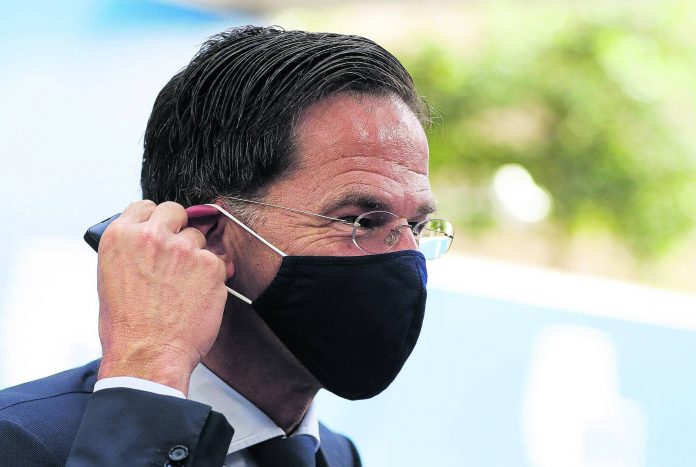
Weary European Union leaders expressed cautious optimism Monday that a deal was in sight on their fourth day of wrangling over an unprecedented 1.85 trillion euro ($2.1 trillion) budget and coronavirus recovery fund, following a weekend of walkouts, flaring tempers and insults.
It took an emotional dinner speech by European Council President Charles Michel about leaders not failing their union, French President Emmanuel Macron venting his deep frustration, and a new set of budget numbers to send the marathon summit onward.
“There were extremely tense moments. And there will be more that no doubt will still be difficult. But on content, things have moved forward,” said Macron, stressing his partnership with German Chancellor Angela Merkel. Without Franco-German agreement, the EU has never taken momentous steps.
“An extraordinary situation demands extraordinary efforts,” Merkel said as the leaders pushed on with one of the bloc’s longest summits ever. What was planned as a two-day summit scheduled to end Saturday was forced into two extra days by deep ideological differences among the 27 leaders.
Overall, spirits seemed to have picked up since the talks hit rock bottom Sunday night.
“It looks more hopeful than when I thought during the night: ‘It’s over,'” said Dutch Prime Minister Mark Rutte, a target of criticism for keeping a compromise impossible.
Rutte, defending the cause of a group of five wealthy northern nations — the Netherlands, Austria, Finland, Sweden and Denmark — sought to limit costs and impose strict reform guarantees on any rescue plan for needy nations. He came under criticism from Macron, Italy and Hungary, whose Prime Minister Viktor Orban asked why the Dutchman had such “hate” toward him.
Rutte took it in stride.
“We are not here because we are going to be visitors at each other’s birthday party later. We are here because we do business for our own country. We are all pros,” he said.
On Sunday night, after three days of fruitless talks and with hope dimming, Michel implored leaders to overcome their fundamental divisions and agree on the budget and recovery fund. Unanimous agreement is required.
Following discussions with leaders Monday, Michel adjusted his proposals and said he was “convinced, that an agreement is possible.”
As he braced for a new round of talks, Italian Premier Giuseppe Conte said he was”cautiously optimistic” after a “tough” confrontations.
“We are offering a response to Europe. From this point of view, there can be no more fooling around,” he said.
The coronavirus has sent the EU into a tailspin, killing around 135,000 of its citizens and plunging its economy into an estimated contraction of 8.3% this year. Spanish Prime Minister Pedro Sanchez insisted the adoption of an ambitious plan was required as the health crisis continues to threaten the continent.
“We must give an answer that gives certainty, reassurance, calm, serenity, both to companies, to workers and to all citizens in order to face this pandemic with all the guarantees,” he said.
The bloc’s executive has proposed a 750 billion euro coronavirus fund, partly based on common borrowing, to be sent as loans and grants to the countries hit hardest by the virus. That comes on top of the seven-year 1 trillion euro EU budget that leaders had been haggling over for months even before the pandemic.
With Macron and Merkel negotiating as the closest of partners, the traditionally powerful Franco-German alliance could not get the quarreling nations in line.
At their dinner Sunday night, the leaders mulled a proposal from the five wealthy northern nations that suggested a coronavirus recovery fund with 350 billion euros of grants and the same amount in loans. The five EU nations — nicknamed “the frugals” — had long opposed any grants at all, while the EU executive had proposed 500 billion euros.
The latest compromise proposal stands at 390 billion euros in grants.
A French diplomat who was not authorized to speak publicly about the negotiations said joint efforts from Merkel and Macron kept hopes of a deal alive twice during the weekend — on Saturday night at a meeting with the frugals that eased tensions, and then on Sunday when an exasperated Macron “metaphorically slammed his fist into the table during dinner.”
“It helped twice relaunch negotiations in a positive way,” the official said, clarifying an earlier account that Macron had actually struck the table.
All nations agree in principle they need to band together but the five richer countries in the north want strict controls on spending, while struggling southern nations like Spain and Italy say those conditions should be kept to a minimum. The five have been pushing for labor market and pension reforms to be linked to EU handouts and a “brake” enabling EU nations to monitor and, if necessary, halt projects that are being paid for by the recovery fund.
Rutte and others also want a link to be made between the handout of EU funds and the rule of law — a connection aimed at Poland and Hungary, countries with right-wing populist governments that many in the EU think are sliding away from democratic rule.
Luxembourg Prime Minister Xavier Bettel said he would not budge on that point.
“To accept that our values are being cut, to have a Europe with values that are being cut, and the rule of law being cut: it will be a ‘no’ from us,” Bettel said.
















